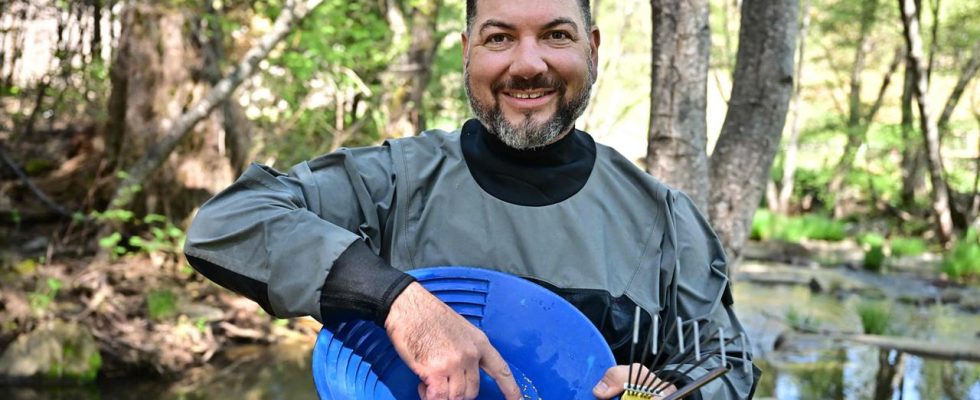report
175 years after the first nugget was found, thousands are again looking for happiness in northern California. They owe the gold rush mood to the consequences of climate change.
Again and again Mark Dayton circles his metal detector over the jagged rocks of a river bank at the foot of the Sierra Nevada. The steady beeping of the highly sensitive tracking device cuts through the silence in the mountains near El Dorado, just 15 minutes by car from where the gold rush began. “One hundred percent gold is hidden in the ground here,” says the 53-year-old. “We just have to find it.”
Anyone in the United States can still stake their claim on public lands and purchase mineral rights from the relevant authority – a right that dates back to the 19th century and is being exercised by more locals and tourists this year than ever before. Northern California is experiencing something like a gold rush 2.0 these days, says Mark: “I’ve never experienced anything like it in my life!”
effects of climate change
What sounds like adventurous fun has a serious background: the devastating forest fires of recent years have worn down the banks of the mountain streams. Winter storms with record rainfall have turned the creeks into rivers and pushed huge masses of boulders into the valleys – filled with fresh gold. “It’s like Mother Nature pressure-washed the hills,” says Albert Fausel of the Gold Country Treasure Seekers, one of California’s most active gold prospecting groups.
Fausel operates what he claims to be the oldest hardware store west of the Mississippi in the former gold digger’s town of Placerville. New customers come to his shop every day to buy pans, sluices or metal detectors. The good business situation gives him courage for the future of the family business: “People always say that the third generation will lose the business – I don’t think that will happen to me.”
Gold price almost at record high
He himself prefers to search under water – dressed in a neoprene suit and equipped with diving goggles, snorkel and pickaxe. After just a few minutes he finds a “picker”. This is what prospectors call a piece of gold large enough to hold between two fingertips. “It looks small at first, but it’s very heavy and therefore worth a lot,” says Fausel. In view of this year’s record prices for gold, a little money can be made with relatively small amounts: an ounce currently costs almost 2,000 dollars on the world market – the equivalent of around 60 euros per gram. “A few hundred dollars quickly add up,” says Albert.
Every third Monday of the month, members of the Gold Country Treasure Seekers meet to philosophize about their finds. “Last time there was $50,000 worth of gold on the table,” said Mark Dayton, the club’s boss. “More than ever!”
More than $8,000 for the record find
In his previous life, Dayton was a police officer and a firefighter. He can now make a living from prospecting for gold – no wonder, with finds worth around $750 a day. His biggest find was seven years ago. On his birthday of all things, he was already returning from an unsuccessful search with a partner when his detector suddenly went off. Dayton dug a hole in the appropriate place, reached in and could hardly believe what he was holding: “A nugget, so big and heavy that I immediately dropped it in shock!”
The sale of his record find brought him more than $8,000. Since then, he has only kept a plastic duplicate in his cluttered study. “Such a find can quickly trigger gold fever,” says Dayton thoughtfully. “And then you get addicted to that feeling.”
Two hands with pyrite, also called “fool’s gold”, and real gold: If you can’t tell the difference, you’ll quickly get frustrated after the first finds.
“After the third rusty nail it’s over”
Only very few gold diggers got rich between 1848 and 1854 – not much has changed to this day. “For most of them, it’s leisure fun,” says ironmonger Albert Fausel. Many would also give up quickly, adds Mark Dayton. Setbacks were part of the gold prospecting. It is not uncommon for a metal detector to hit the wrong spot – which causes a lot of frustration: “After the third rusty nail, it’s often over.”

